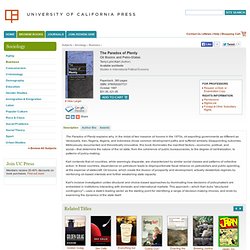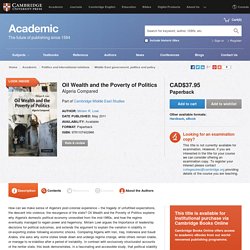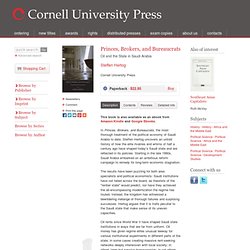

Oil and Democracy revisited. State Formation Processes in Rentier States. The Political Economy of the Resource Curse. Cursed by resources or institutions? Richard-auty-oil-and-development-in-the-middle-east.pdf. The Paradox of Plenty : Terry Lynn Karl. The Paradox of Plenty explains why, in the midst of two massive oil booms in the 1970s, oil-exporting governments as different as Venezuela, Iran, Nigeria, Algeria, and Indonesia chose common development paths and suffered similarly disappointing outcomes.

Meticulously documented and theoretically innovative, this book illuminates the manifold factors—economic, political, and social—that determine the nature of the oil state, from the coherence of public bureaucracies, to the degree of centralization, to patterns of policy-making. Karl contends that oil countries, while seemingly disparate, are characterized by similar social classes and patterns of collective action.
In these countries, dependence on petroleum leads to disproportionate fiscal reliance on petrodollars and public spending, at the expense of statecraft. Oil booms, which create the illusion of prosperity and development, actually destabilize regimes by reinforcing oil-based interests and further weakening state capacity. Oil Wealth and the Poverty of Politics. How can we make sense of Algeria's post-colonial experience – the tragedy of unfulfilled expectations, the descent into violence, the resurgence of the state?

Oil Wealth and the Poverty of Politics explains why Algeria's domestic political economy unravelled from the mid-1980s, and how the regime eventually managed to regain power and hegemony. Miriam Lowi argues the importance of leadership decisions for political outcomes, and extends the argument to explain the variation in stability in oil-exporting states following economic shocks. Comparing Algeria with Iran, Iraq, Indonesia and Saudi Arabia, she asks why some states break down and undergo regime change, while others remain stable, or manage to re-stabilise after a period of instability. In contrast with exclusively structuralist accounts of the rentier state, this book demonstrates, in a fascinating and accessible study, that political stability is a function of the way in which structure and agency combine. Princes, Brokers, and Bureaucrats, Oil and the State in Saudi Arabia. In Princes, Brokers, and Bureaucrats, the most thorough treatment of the political economy of Saudi Arabia to date, Steffen Hertog uncovers an untold history of how the elite rivalries and whims of half a century ago have shaped today's Saudi state and are reflected in its policies.

Starting in the late 1990s, Saudi Arabia embarked on an ambitious reform campaign to remedy its long-term economic stagnation. The results have been puzzling for both area specialists and political economists: Saudi institutions have not failed across the board, as theorists of the "rentier state" would predict, nor have they achieved the all-encompassing modernization the regime has touted. Instead, the kingdom has witnessed a bewildering mélange of thorough failures and surprising successes. Hertog argues that it is traits peculiar to the Saudi state that make sense of its uneven capacities.
Oil rents since World War II have shaped Saudi state institutions in ways that are far from uniform. Saudi Arabia: Reading / Resources. The Political Economy of Oil.